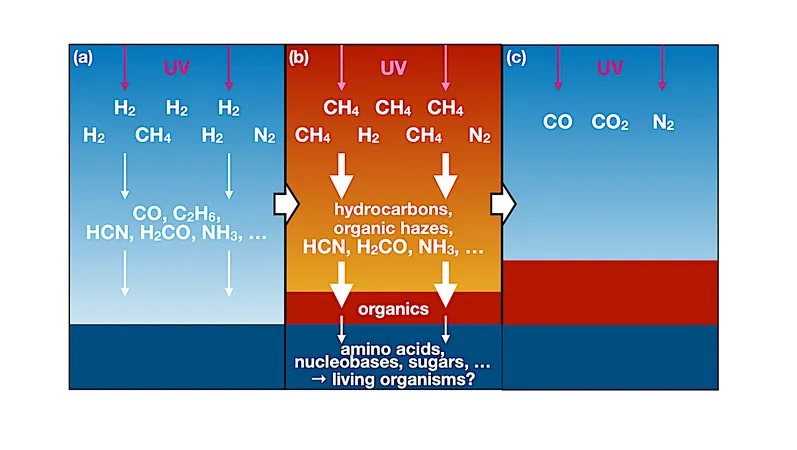
Unveiling the Secrets of Early Earth's Atmosphere: The Birthplace of Life?
2024-10-29
Author: Siti
Introduction
In a groundbreaking study, researchers have unveiled a fascinating glimpse into Earth's primordial atmosphere, which is believed to have been a reduced proto-atmosphere, rich in hydrogen (H2) and methane (CH4). This unique mix likely formed through the accretion of building blocks containing metallic iron, alongside the gravitational trapping of gas from surrounding nebulae.
Chemical Evolution
Initially, this moist, reduced atmosphere blanketed a nascent ocean, setting the stage for an extraordinary chemical evolution. Over time, it transitioned to more oxidized compositions due to complex photochemical processes involving reactions with radicals produced from water (H2O) and the selective escape of hydrogen into space. During this transformative period, the atmospheric methane underwent photochemical reactions that not only produced carbon-based oxides but also complex organic molecules.
Mystery of Organic Matter Formation
Despite the significance of this process in understanding the abiotic chemical evolution of early Earth, the ratio at which organic matter was formed in relation to oxidation had remained a mystery. However, through advanced numerical analyses, researchers have discovered that ultraviolet (UV) absorptions by gaseous hydrocarbons, including ethyne (C2H2) and allene (C3H4), significantly inhibited the photolysis of water, thereby slowing down subsequent methane oxidation in this wet proto-atmosphere.
Significant Findings
The team's findings reveal that nearly 50% of the initial methane was converted into heavier organic compounds. This transformation led to the deposition of essential prebiotic molecules such as hydrogen cyanide (HCN) and formaldehyde (H2CO) on the surface of the primordial ocean, persisting for geological time scales of about 10 to 100 million years.
Implications of the Research
The implications of this research are profound. The accumulation of diverse organic and prebiotic molecules in the early oceans may have created a chemically rich environment, often referred to as 'primordial soup,' where the building blocks of life could have originated. This remarkable discovery not only sheds light on the conditions under which life may have evolved on Earth but also raises intriguing questions about the potential for life to exist in similar environments beyond our planet.
Conclusion
The research was conducted by a team of leading scientists: Tatsuya Yoshida, Shungo Koyama, Yuki Nakamura, Naoki Terada, and Kiyoshi Kuramoto. Their work invites further exploration into the conditions that fostered the emergence of life and the intricate dance of chemistry that occurred in those distant times. Could this model of organic synthesis provide insights into extraterrestrial life? Only time—and more research—will tell!



 Brasil (PT)
Brasil (PT)
 Canada (EN)
Canada (EN)
 Chile (ES)
Chile (ES)
 España (ES)
España (ES)
 France (FR)
France (FR)
 Hong Kong (EN)
Hong Kong (EN)
 Italia (IT)
Italia (IT)
 日本 (JA)
日本 (JA)
 Magyarország (HU)
Magyarország (HU)
 Norge (NO)
Norge (NO)
 Polska (PL)
Polska (PL)
 Schweiz (DE)
Schweiz (DE)
 Singapore (EN)
Singapore (EN)
 Sverige (SV)
Sverige (SV)
 Suomi (FI)
Suomi (FI)
 Türkiye (TR)
Türkiye (TR)